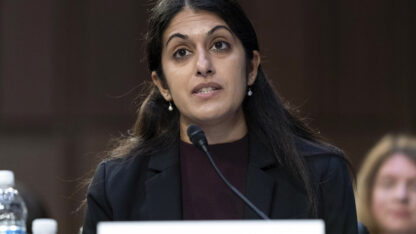Georgia diabetics hope for lower insulin costs this year after seniors see copays capped

Diabetic Atlanta resident Tommy Marshall, 54, has health insurance. But he still pays $600 a month out of pocket for his insulin medication at the pharmacy counter until his plan’s annual deductible is met.
“Almost every time I’ll go in, the pharmacists are like, do you understand how much this is? And they look at me kind of wide-eyed and I’m like, yeah, but I need this to be healthy and to manage this disease,” Marshall said. “So, you just fork over the money.”
He needs several injections of insulin throughout the day, and one before he goes to sleep every night.
“Insulin is life. It’s like air if you’re a diabetic. And so to not have access to it due to the financial demand is really unacceptable,” Marshall said. “It’s been around for over 100 years. And so why can’t every American who needs it be able to get it at an affordable base?”
This was the topic of an Atlanta roundtable discussion this week that included Democratic U.S. Sen. Raphael Warnock of Georgia, diabetes patients and advocates, and Chiquita Brooks-LaSure, administrator for the United States Centers for Medicare and Medicaid Services.
Warnock is continuing his push from last year to lower insulin prices for more people who rely on the medication to control their diabetes.
And he’s touting the $35 per month cap on insulin for seniors with Medicare that took effect in January as part of the Inflation Reduction Act.
“I think there’s a reason why 20 states have capped the cost of insulin. This is not a partisan issue. It’s a human issue,” he said at Southside Medical Center in the Peoplestown neighborhood in Atlanta. “If you look at the math, it’s the smart thing to do.”
The senator is cosponsoring a bipartisan bill with Republican U.S. Sen. John Kennedy of Louisiana that would extend the cap to all diabetics with private insurance for one of each insulin dosage form and type, and mandate a new assistance program to cap it for uninsured patients.
More than 8 million Americans need insulin to manage their diabetes, according to the American Diabetes Association.
And insulin prices have tripled over the last two decades.
Even with health insurance, many diabetics can pay hundreds of dollars per month out of pocket for the medication. And uninsured diabetics typically pay the most for their insulin.
Research shows that many diabetics ration their insulin because of cost, putting them at risk for severe complications.
Lacy McGee from East Atlanta is 29 years old and has lived with Type 1 diabetes for more than a decade.
She recalled a time several years ago when she was struggling financially and couldn’t afford enough insulin to manage her diabetes.
“I had no health insurance. I was rationing,” she said. “I hadn’t seen a doctor in years.”
Now, she is insured. She administers her insulin using a pump and continuous glucose monitor.
McGee is insured now but said her insulin and her diabetes equipment are still a big monthly expense.
“There are a lot of things that you sacrifice to be a healthy diabetic. Copays aren’t cheap, even for my pump and my continuous glucose monitor,” she said.
Some insulin makers, including Novo Nordisk and Eli Lilly, recently announced plans to lower the costs of some insulin products.
“They see the handwriting on the wall. I would argue that their lowering the cost is a direct result of our work on this issue,” said Warnock. “So we have to keep pushing it. The marketplace alone is never a panacea for all problems. And so part of the dosage you need, if you will, to get this corrected in terms of the politics is good legislation coupled with the innovation that we hopefully will continue to see in the private sector.”
The American Diabetes Association is backing a bipartisan bill cosponsored by Democratic U.S. Sen. Jeanne Shaheen of New Hampshire and Republican U.S. Sen. Susan Collins of Maine.
That bill would also cap out-of-pocket insulin costs at $35 per month, help reduce patient premiums. And increase competition in the insulin market.








